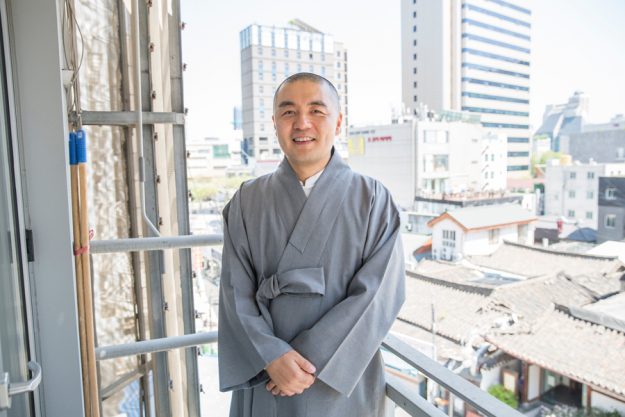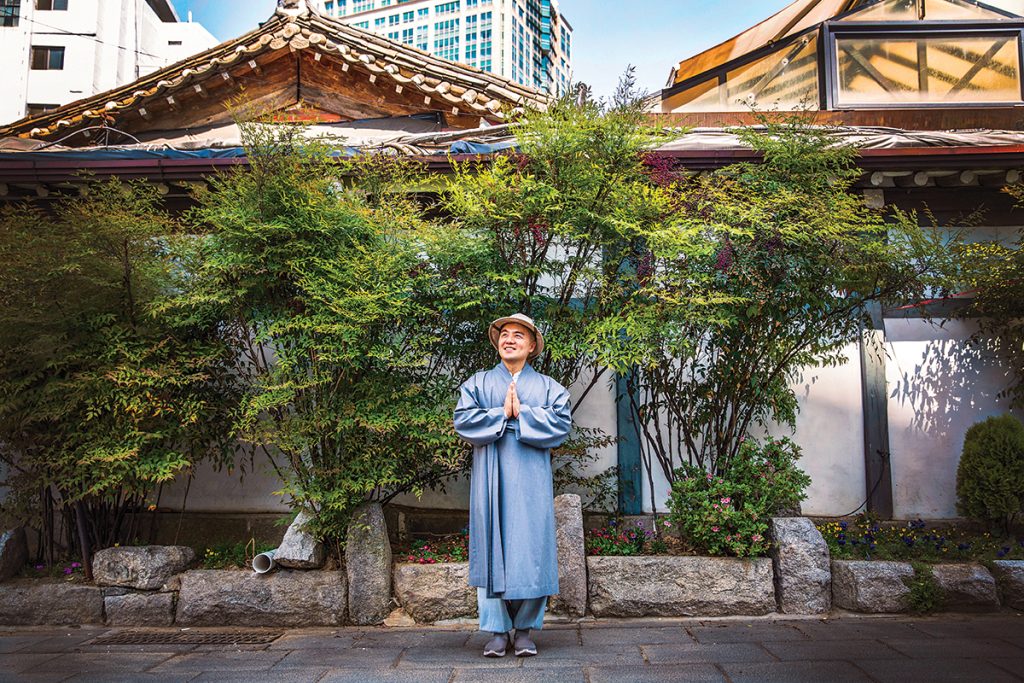“Whenever I look at my son and think about all the difficulty he will go through in the future, all I can think about is jumping out of my apartment window together with my baby.’”
Haemin Sunim, Korea’s famous “Twitter monk” and the founder of the School of Broken Hearts in Seoul, is recounting the words of a woman who had come to one of the school’s support groups for parents with disabled children. In Korea, it’s not just the logistical and financial difficulties involved in raising a child with disabilities that these parents are contending with. It’s also the reality that Korean society considers it shameful to have given birth to one. But speaking with the other mothers at the support group gave the woman “a different perspective and emotional strength to carry on,” Haemin Sunim said.“I felt really good after that session.”
Related: Dispatch from South Korea
If this sounds like an unusual scene for a Buddhist center, that’s because it is. Although the School of Broken Hearts, founded in 2015, offers traditional meditation instruction and Buddhist liturgical practices such as reciting and visualizing the Lotus Sutra, the majority of the school’s programming is aimed at healing life’s hurts: there are groups for online bullying, bereavement, anger management, dating violence, and more. The school also provides personal counseling and has eight therapists on staff from other religious traditions, including Protestantism and Catholicism.
“I wanted to transcend religion,” said Haemin Sunim about the school. “You don’t need to have any kind of religious affiliations. If you are going through a difficult time, you can come and learn.”
With some five thousand visitors annually, the School of Broken Hearts has become so popular that a second center in Pusan, Korea’s second-largest city, opened in October 2018.
Dubbed the “Twitter monk” by the media—he has over a million followers—Haemin Sunim came up with the idea of the school precisely because of the social media platform.
While on a sabbatical in 2010 from Hampshire College in Amherst, Massachusetts, where he taught courses on Buddhism, Haemin Sunim started his Twitter account. It was a flop, he said, until he realized that unlike the comings and goings of President Obama, whom he looked to for social media inspiration at the time, what he himself ate for lunch and his other daily activities were “terribly uninteresting.” So he started posting reflections garnered from his meditation practice instead. Soon he had ten thousand followers. An offline gathering came next, where the monk was able to meet his Twitter fans in real life and give them a space to talk openly about the problems they were facing. Over the course of a year, the gatherings grew from 60 attendees to over 400. Haemin Sunim was inspired.
Haemin Sunim grew up in a non-Buddhist family in Korea and came to the US in 1991 to study film at UC Berkeley. Tired of the party culture and propelled by life’s ultimate questions, he moved from his college dorm into the nearby Sixth Patriarch Zen Center, where the abbot encouraged him to become a monk. Abandoning film, he began the ordination process while attaining his master’s at Harvard Divinity School, and trained at Haein Monastery in Korea. (Haein is associated with the Jogye Order, Korea’s largest Buddhist school.) When he finished, he returned to the US, received his doctorate from Princeton, and began teaching at Hampshire College before he realized that he “wasn’t a very good scholar.”
“It became tedious and boring,” he said. Instead of reading an ancient text and trying “to figure out what kind of political situation influenced this kind of idea, the rise of that idea,” he was interested in meditation and practice. At the same time, he became “disheartened” to see Buddhism and other religious traditions struggle to meet people where they were.

“For example, you’ve just had a divorce,” he said. “And then you go to a Buddhist master and he says, ‘Oh, just pray more to Guanyin [deity of compassion] or do more prostrations, and you’ll be fine.’” Haemin Sunim wanted to provide a space where people could go for practical help.
Despite his innovative approaches, Haemin Sunim feels that his work is squarely in line with the Buddhism he has been taught, which emphasizes healing; the main buddha of his current teacher, Hwikwang Sunim at the Bulkwang Zen Center in Tappan, New York, is the Medicine Buddha. “What I’m doing is just natural activity, like an expansion of the prayer I’ve been doing [to Medicine Buddha],” Haemin Sunim said. He sees the School of Broken Hearts as having three aims: healing, emotional and spiritual growth, and awakening.
Along the way, he has written two books. The Things You Can See Only When You Slow Down, a bestseller in Korea with over three million copies sold, was published in English by Penguin Random House in 2017. His second, Love for Imperfect Things, came out in December 2018 and soon hit the Sunday Times bestseller list (alongside Michelle Obama’s Becoming).
While his message is clearly resonating, Haemin Sunim says that he’s gotten heat from some activists who think he should be more politically oriented. Though his main focus is psychological, he doesn’t ignore external realities. He mentions capitalism, for instance, as a primary reason that people in both the East and the West feel “constantly under pressure to perform, to be perfect.” And the school’s groups do have discussions concerning practical support, like how to apply for government aid or take advantage of resources for job seekers. It’s one of the benefits of bringing together people who have gone through similar difficulties.
Next on his mind is teaching more frequently in the US and abroad, where he’s sure to receive more questions about how to ride the ups and downs of daily life.
That said, Haemin Sunim doesn’t pretend to have all the answers. Does he ever not know what to say when someone asks his advice? “Oh, yeah. Oftentimes after giving my answer I feel that it was a terrible answer!” he said.
“But I have to be very careful,” he added. “It’s not just about giving them the right answers. It’s about the attitude, how I approach the problems. They want to be heard.”
Thank you for subscribing to Tricycle! As a nonprofit, we depend on readers like you to keep Buddhist teachings and practices widely available.
